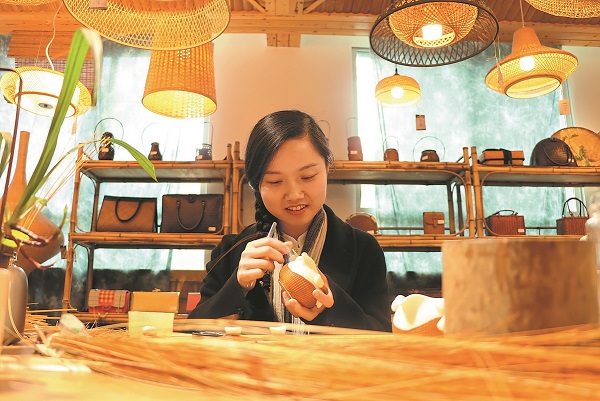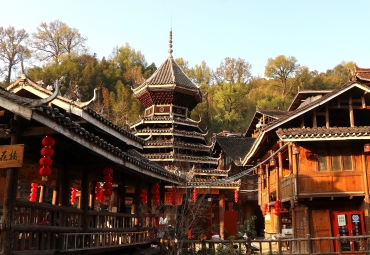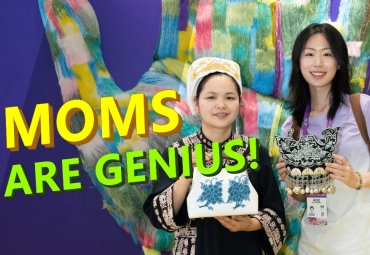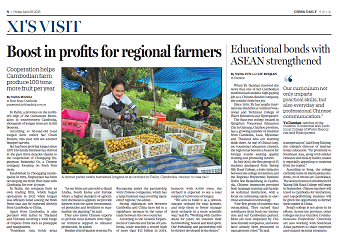Chishui's bamboo industry shoots to new heights

Yang Liu drifts on a bamboo pole while balancing herself with another on a lake in the Chishui Bamboo Sea in Zunyi, Guizhou province. [Photo provided to China Daily]
In the serene mornings of Chishui, a county-level city in Zunyi, Guizhou province, local resident Yang Liu can often be found honing her skills in the art of bamboo drifting among the flowing rivers that wind through bamboo forests. With a long bamboo pole in hand and poised gracefully on another pole, she navigates the waters with finesse, showcasing the beauty of this traditional folk sport.
Through the sharing of her videos on social media, Yang, a recognized inheritor of the national intangible cultural heritage of Chishui single bamboo drifting, introduces the enchanting allure of the Chishui Bamboo Sea to a broader domestic and international audience.
Located in the northern part of Guizhou, the "sea of bamboo" covers 88,500 hectares. The bamboo forests paint a picturesque green landscape that captivates the eye and provides significant economic benefits to drive rural vitalization.
Last year, the total output value of the bamboo industry in Chishui reached 8.31 billion yuan ($1.16 billion), with bamboo-related income accounting for approximately 65 percent of the city's GDP.
Local authorities, as reported by Guizhou Daily, are dedicated to promoting sustainable cultivation and harvesting methods to preserve the ecological balance of the bamboo sea. Each year, approximately 15 million bamboo poles and 1 million metric tons of miscellaneous bamboo items are harvested in Chishui, involving 180,000 bamboo farmers.
They can earn over 5,000 yuan per person annually through the sale of bamboo raw materials and engagement in related industries.
Yang Changqin, a National People's Congress deputy and a sixth-generation inheritor of the provincial intangible cultural heritage Chishui bamboo-weaving, has elevated traditional bamboo weaving to a fusion of practicality and artistic aesthetics.
Through innovative designs, she has expanded the range of bamboo products to weaving accessories, fiber paintings, art lamps and more.
"Development is the best form of inheritance. We must innovate products that align with contemporary aesthetic standards and integrate them into daily life scenarios, possessing commercial attributes to better promote inheritance and development," she said.
In 2019, Yang established Jizhutang, a base for the production, research, design, apprentice training, experiential learning and sales of intangible cultural heritage bamboo-weaving in Datong town, Chishui.
The base has uplifted the livelihoods of over 2,000 individuals, helping increase their average annual income by over 30,000 yuan.
Led by individuals such as Yang Changqin, Lu Huaying and Ma Qiang, the bamboo craft inheritors in Chishui have propelled the evolution of traditional bamboo craftsmanship toward contemporary bamboo paintings, handbags, carvings and landscape fans.
These creative products are distributed globally, enhancing the reputation of the Chishui Bamboo Sea.

Yang Changqin weaves bamboo at a workshop in Chishui. ZHANG LANG/FOR CHINA DAILY
With a short growth cycle of 3 to 5 years, bamboo serves as a rapidly replenishing, biodegradable biomass material, offering an effective solution to reduce plastic pollution.
Last October, the National Development and Reform Commission and other departments issued a 3-year action plan to accelerate the development of replacing plastic with bamboo, encouraging major bamboo-producing regions to expand the industrial chains.
Seizing upon these opportunities, Chishui has prioritized the development of the bamboo industry as its flagship sector.
Nearly 300 enterprises have gathered along the bamboo industrial chain, capable of producing over 300 products, including building materials, furniture and daily necessities.
"Bamboo pulp products can fully degrade in just 45 to 90 days, offering high quality and environmental friendliness," said Cao Yuan, design director of Guizhou Zhusu Huanbao Technology, a molding enterprise utilizing bamboo pulp boards as its raw material.
The company has produced 100,000 bamboo pulp mooncake boxes and 500,000 pairs of bamboo pulp shoe inserts in the first half of the year, with exports reaching Europe and the United States.
The local government in Zunyi has actively encouraged the integration of bamboo office supplies and dining utensils into government procurement, facilitating the gradual replacement of plastic packaging materials in key local industries such as liquor.
"Bamboo-made packaging boxes are more eco-friendly than plastic packages," said Zhang Wantian, marketing department manager of Guizhou Xinjin Bamboo Wood Products, mentioning that five local liquor companies have already expressed interest in customizing bamboo packaging.
Yao Lianshu, president of the company, highlighted that as a leading national forestry enterprise, their product range is diversifying with the rising trend of replacing plastic with bamboo.
Within their workshop in Chishui Bamboo Industry Park, bamboo poles are meticulously cut, sliced, carbonized, dried and assembled by skilled workers to craft complete bamboo boards.
These boards are used in the creation of bamboo flooring and furniture, as well as unique products like bamboo toilet seat covers, bamboo electronic scales and more.
Yao mentioned that the production of toilet seat covers primarily targets the European market, with exports last year accounting for a quarter of the company's output value.
All rights Reserved. 京ICP备13028878号-8







 Overview
Overview Guiyang
Guiyang Guian New Area
Guian New Area Liupanshui
Liupanshui Anshun
Anshun Qianxinan
Qianxinan Qiandongnan
Qiandongnan Qiannan
Qiannan Zunyi
Zunyi Tongren
Tongren Bijie
Bijie Guizhou commits to culture preservation and rural vitalization
Guizhou commits to culture preservation and rural vitalization Guizhou voice at 2025 national two sessions
Guizhou voice at 2025 national two sessions Meet the 'genius moms' at Shenzhen cultural fair
Meet the 'genius moms' at Shenzhen cultural fair 

